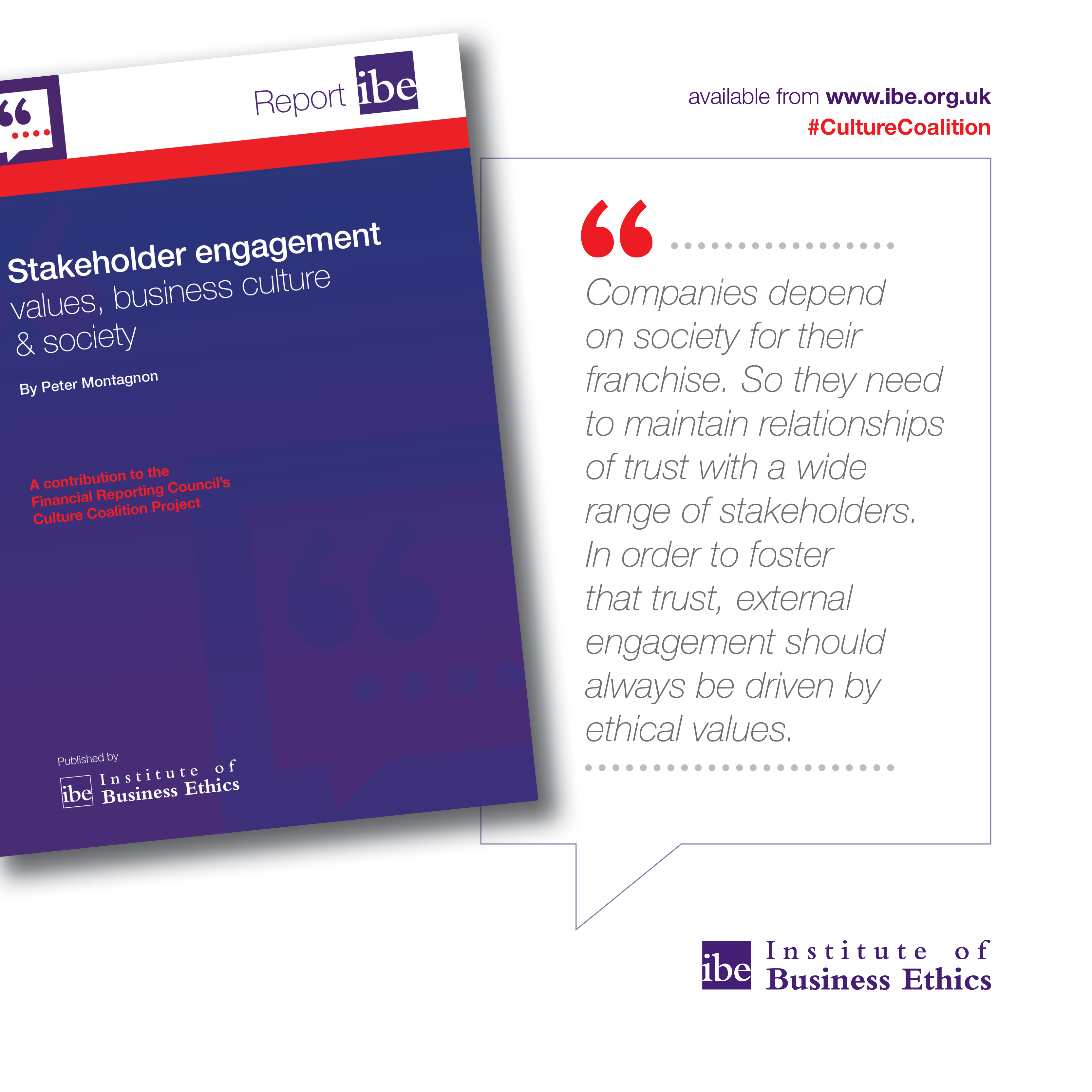Companies must engage fully with the society which gives them their licence to operate, but their first task is to work out what their values are so they have something to communicate, new IBE report says
It is vital for companies to relate properly to the society from which they derive their licence to operate
20th July 2016: The Institute of Business Ethics (IBE) today publishes: Stakeholder engagement: values, business culture and society, a report commissioned by the Financial Reporting Council (FRC) as part of its Culture Coalition project.
The report contains a series of case studies detailing how companies such as TalkTalk, Unilever, BAE Systems and L’Oreal have brought ethical values to bear in dealing with stakeholders, as well as an interview with Frances O’Grady, TUC General Secretary.
It is vital for companies to relate properly to the society from which they derive their licence to operate, the report says. A considered approach to engagement with a range of external stakeholders is therefore a core task for boards and management, but there is no point in embarking on such a course unless the company is clear in the first place what its values and purpose are. If this is not the case the message will be confused. External engagement should always be driven by the values.
Among its other conclusions the report says:
- It is important for companies to engage with a wide range of stakeholders. The report ranges through a number of these including employees, customers, regulators and NGOs as well as shareholders. The task is slightly different with shareholders who elect the board and to whom it is directly accountable. Boards have to be involved in shareholder engagement, whereas their role in other forms of engagement is more about overseeing what the management does.
- Where shareholders are concerned there is an important challenge in improving the quality of dialogue and broadening the agenda. Both sides probably have to make efforts to overcome obstacles to do this and there may be a need to recalibrate corporate disclosure to make it more relevant. For example, shareholders need more information on staff turnover and possibly a simpler approach to remuneration which would require less disclosure and make it easier to control.
- The attitude to customers is critical to culture and therefore to a sustainable business, but evidence shows that an engaged workforce is usually associated with a strong commitment to customer value.
- Social media is an opportunity as well as a risk. Companies need to have a clearly defined approach.
- In all cases companies should regard engagement as being about listening rather than simply communicating their own views. Lobbying is most effective when it involves working out the interests of stakeholders and working with them to mutual advantage rather than trying to push the company’s narrow self interest.
In her interview, Frances O’Grady points to the disparity between the long term commitment of employees to their company and the short term tenure of most chief executives. This is exacerbated by the increasing level of overseas investment in UK shares which means owners of companies can appear remote. Employees need to be given a voice, she says.
Philippa Foster Back CBE, IBE’s Director, said:
“We are very pleased to have supported the FRC Culture Coalition project. This report raises very important issues about the role of companies and the relationship of business to society. In the current climate of uncertainty, there is more need than ever to get this right.”
Stakeholder Engagement: values, business culture and society complements other work stream outputs covering people, measuring and assurance and the role of the board and forms part of the FRC's Report of Observations, to be published 20th July.
David Styles, Director of Corporate Governance at the FRC said:
"Company directors have responsibilities not only to shareholders, but to customers, suppliers and wider society. Building trust with these stakeholders also supports the creation of value in the long-term and success of business. The work IBE has contributed to this project is important at a time when there is much debate about the role of business in society."
ENDS/
EDITORS’ NOTES
Stakeholder Engagement: values, business culture and society By Peter Montagnon
ISBN 978-1-908534-28-6 Free download from www.ibe.org.uk
Publication date: 20th July 2016
About the FRC Culture Coalition
This report has been prepared for the Financial Reporting Council’s Culture Coalition project.
The IBE was helped in its task by an expert advisory group drawn from IBE subscribers among the corporate community. This was chaired by Robert Swannell, Chairman of Marks & Spencer, and its members were Deborah Allen (Managing Director Corporate Responsibility at BAE Systems), Ian Barlow (Independent Non-Executive Director and Chairman of the Audit Committee at Smith and Nephew), Claire Chapman (General Counsel and Company Secretary at DMGT), Pierre Goad (Group Managing Director, Group Head of Human Resources at HSBC) and Gareth Tipton (Group Director Ethics & Compliance and COO at BT).
With the guidance of the advisory group and the additional assistance of the FRC the IBE conducted a series of interviews both generally and in connection with the case studies. This report is the product of that effort.
The Financial Reporting Council is the UK’s independent regulator responsible for promoting high quality corporate governance and reporting to foster investment. We promote high standards of corporate governance through the UK Corporate Governance Code. We set standards for corporate reporting, audit and actuarial practice and monitor and enforce accounting and auditing standards. We also oversee the regulatory activities of the actuarial profession and the professional accountancy bodies and operate independent disciplinary arrangements for public interest cases involving accountants and actuaries.
About the IBE
The Institute of Business Ethics is a registered charity which promotes high standards of business practice based on ethical values.
We help organisations to strengthen their ethics culture through the sharing of knowledge and good practice. www.ibe.org.uk
The author: Peter Montagnon
Peter Montagnon joined the IBE as an Associate Director in September 2013. Prior to that he was Senior Investment Adviser at the Financial Reporting Council, which he joined after almost ten years as Director of Investment Affairs of the Association of British Insurers.
For two decades from 1980 Peter was a senior journalist on the Financial Times, including spells as Head of the Lex Column and in charge of coverage of the international capital markets. His last assignment, from 1994 to 2000, was as Asia Editor, responsible for the FT’s coverage of a region stretching from Pakistan to New Zealand.
After graduating in Modern Languages from Cambridge University in 1972, he joined Reuters news agency as a financial journalist. At Reuters he completed assignments in Hong Kong, Zurich and Washington before joining the Financial Times.
Peter served on the European Commission’s Corporate Governance Forum from 2005 - 2011. He is past Chairman of the Board of the International Corporate Governance Network and is also a visiting Professor in Corporate Governance at the Cass Business School of the City University, London, and a member of the Corporate Governance Advisory Board of the Norges Bank Investment Management and of the Board of the Hawkamah Institute for Corporate Governance, Dubai.
Press release distributed by Pressat on behalf of Institute of Business Ethics, on Tuesday 19 July, 2016. For more information subscribe and follow https://pressat.co.uk/
Ethics Business Ethics Culture Corporate Governance Stakeholder Shareholders Customers Business & Finance Charities & non-profits Computing & Telecoms Construction & Property Government Manufacturing, Engineering & Energy Medical & Pharmaceutical Opinion Article Public Sector & Legal
You just read:
Companies must engage fully with the society which gives them their licence to operate, but their first task is to work out what their values are so they have something to communicate, new IBE report says
News from this source:




